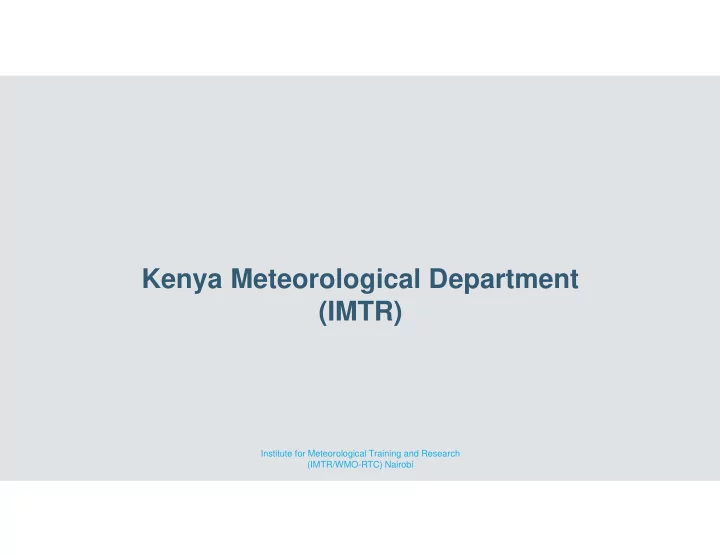

Kenya Meteorological Department (IMTR) Institute for Meteorological Training and Research (IMTR/WMO-RTC) Nairobi
INSTITUTE FOR METEOROLOGICAL TRAINING AND RESEARCH/ WORLD METEOROLOGICAL ORGANIZATION REGIONAL TRAINING CENTRE (IMTR/WMO-RTC), NAIROBI IMTR/WMO-RTC is a major Branch of the Kenya Meteorological Department (KMD) of the Ministry of Environment and Forestry It’s charged with the responsibility of training personnel in meteorology, hydrology and related geo-sciences in the country and the Anglophone countries in Africa. Institute for Meteorological Training and Research (IMTR/WMO-RTC) Nairobi
TRAINING Activities Touching on Drought and Food Security Forecasting We train our personnel new ways to produce forecasts that are accurate, timely and all based on information from available platforms. Early Warning Having received support via new technologies and innovative collaboration between partner organization, training for early warning has become an easy task Capacity Building We know that coordinated approach through capacity development on drought issues would enhance food security, reduce the vulnerability of the poorer sections of society and promote economic growth. Research Drought and food security are of global concern and require urgent interventions to ensure that they do not jeopardize the lives of many people and the ecosystem. This is done through research. Institute for Meteorological Training and Research (IMTR/WMO-RTC) Nairobi
Mandate The Balance KMD – Daily Operations IMTR - Training key elements: The relationship between the administrative/operation based met. offices and the institute have noted that there are several key elements to consider when considering extreme weather events : • Promoting new standard approaches to training, operational and creating awareness of these extreme events; • Implementing effective monitoring and early warning systems; • Enhancing preparedness in studying, monitoring and forecasting; • Understanding the cost of inaction. Training Operations Awareness Acquired Skills Processes Dissemination Institute for Meteorological Training and Research (IMTR/WMO-RTC) Nairobi
Outcomes Within our mandate as a training center Training and development of our staff and ongoing efforts that are made within our organization has improved the performance and self-fulfillment of our employees through a variety of skills and programs. Improved forecasting and services in KMD in the last decades have been tremendous helpful and this has been achieved due to the well trained and equipped personnel. Better understanding of the everchanging dynamics of forecasting tools has enabled us to overcome the challenges faced in day to day operations. Improved early warnings and improved climate/weather information – the development of appropriate public service announcements on what to do when bad weather hits – integrating communications into the everyday activities of KMD, save lives, supporting sustainability and building livelihoods. Institute for Meteorological Training and Research (IMTR/WMO-RTC) Nairobi
END Have a blessed day and I hope you enjoyed
END Have a blessed day and I hope you enjoyed
Recommend
More recommend